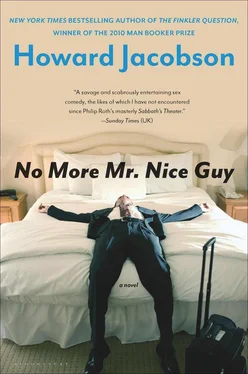A fat girl’s knickers.
So it could have been the word that did it. Pity the poor comedian. How could she have known what an associational minefield she was stepping into when she winningly pureed up her lips and questioned Frank’s intentions as to her underwear? D for Dilys. D for displeasure. Disinclination. Disgust. Distemper. Death.
(Unless, of course, distemper was the very effect she was going for, she being a comedian, and he being a man and all.)
But in fact — and whether or not — the reason for Frank’s abrupt and somewhat rude departure lay elsewhere. He rose from the table, white as a ghost, as though he’d seen a ghost, because he had. The ghost he’d seen was Liz.
He saw her through the window, standing on the street, looking in. Then he saw her coming through the door and pushing her way into the bar. Then he saw her seeing him. Then he saw her go.
There can be no doubt that it is her. The eyes may be twenty-five years more tired than they were when he last leapt into them, ablaze in Montmartre, but they are the same electric green. The discontented brackets that qualify her mouth are also unmistakable. She always did look sour and cheated. That those brackets could be coaxed into quite other configurations, that she could be amused into an eruption of laughter lines and carefree creases, had much to do with her appeal for Frank. He loved changing the geography of her face. He could do it still. In the fraction of a second that is given him to learn what has become of her he sees that she hasn’t once and for all given up expecting to be diverted. Not bad for a woman of fifty. And a summons to him, if ever he saw one.
So the fat comedian’s feelings, frankly, don’t come into it. There goes Liz, and he is up and after her.
He thinks he sees her hurrying down Montpellier. But it isn’t her. He has the hair wrong. He can’t be expected to have noticed what colour her hair is now. Or what clothes she is wearing. A suit, he thinks. Grey, like a man’s. She used to buy her suits from Jaeger. Now, presumably, with Kurt a media professor and no doubt an Eco man, she’ll have turned to the Italians herself. Armani. Versace. He follows a loose-woven grey jacket into a would-be Irish pub with a fatuous name but he is wrong again. He goes back out into the street and looks about him. Should he recover his car from the carpark and go after her on wheels? If she did see him and she is fleeing she’ll be long gone by the time he gets his car out. He runs his hands through his hair. What to do? He has her address in his wallet; he could get the car out, drive to where she lives and, assuming she is not driving herself (which is not a safe assumption), wait for her to come home. And then what? A scene outside the house? Children screaming. Neighbours coming to their windows. Kurt enraged. His hand raised. Haven’t you been warned? Not to call, not to write, not now, not tomorrow, not ever.
Is this the slow subtle reconciliation — Frank! Kurt! — he’s been planning?
But what if Liz isn’t fleeing from him? Because he saw and recognised her in a flash, he’s taking it for granted that she must have seen and recognised him instantaneously too. But they aren’t equally placed, are they. He knows he’s here, she doesn’t. In a manner of speaking, he’s been expecting to see her. But she can’t have been expecting to see him. Unless … Unless he’d been spotted earlier in the day. Unless she’d got wind of him. Unless Kurt has had him under surveillance for the last quarter of a century, and today, at last, has known the hour for sacrifice has come — ‘He’s here. Go to him!’ Like the mountie releasing Rose Marie to the irreducible wildness of the mountains. So was she coming to him? If she was coming to him, why was she running from him? Dumb question, Frank. What if she wasn’t running from him at all, but leading him? But then again, if she was leading him why had she lost him? There is only one answer to that. She supposes that he’ll know where to find her. There is such a thing as the secret language of love; lovers know what each other is thinking; they presume on their shared history; what they did yesterday, where they went yesterday, is inscribed on their hearts. So where did Frank and Liz go yesterday? France? Was that as long ago as yesterday? Well, he for his part has already honoured France in his heart by going to Montpellier and drinking Fleurie. And she for her part has read him aright by coming to Montpellier to find him. So far, so faithful. His turn. Where else? Narrow it down. France, Paris, Montmartre, balcony, bed … Bed! She’s gone to the Queens! She’s found out where he’s staying, she’s shown him her face, she’s fled in the night and now she’s waiting for him in the foyer of his hotel. He can hear the lisping of her stockings as she crosses and uncrosses her legs. No she isn’t; she’s waiting for him face down on his bed. The sound he hears is the squeaking of his sheets.
And how long has he been standing in the street combing his fingers through his hair? He starts to run towards the hotel. What if she was waiting for him face down on his bed, but has given up on him? What if Kurt is expecting her back; what if he has said you can have one last hour with him, not a minute more? The Fleurie is now a pool of acid in his stomach. He feels as sick as a jilted boy.
She is not in the foyer. He sees several sets of legs crossed in wing chairs, but Liz is not on the end of any of them. He can’t wait for the lift. He dashes up the stairs, round and round the rectangular lightwell. The carpet is smudged crimson, the colour of his gut. He turns the key in the lock, breathes in, breathes out, and proceeds inside.
She isn’t there.
‘I KNOW,’ FRANK TELLS himself, ‘what I must not do now.’
This is one of the advantages of age. You know so much. You know what you owe to yourself. You know how to protect your peace of mind. You know consequences. Outcomes. You see the end in the beginning. You know how you feel in the morning.
He sits on the edge of his bed and makes a list of what he must not do.
He must not order another bottle of red wine from room service.
He must not ring Kurt. Tell him he loves him. Tell him he’s sorry. Then ask to speak to Liz.
He must not ring Kurt full stop.
He must not go back to the wine bar to find D.
He must not ring Mel.
He must not think of Mel bearding some other man.
He must not get into his car and go looking for whores. (Whores in Cheltenham? There are whores everywhere. And if there aren’t whores in Cheltenham there’ll certainly be whores in Gloucester. He must not get into his car and go looking for whores in either place.)
Once having made this comprehensive list of what he must not in any circumstances do, Frank feels altogether better about getting up off the bed and going ahead and doing them.
Of course not all of them.
He doesn’t, for instance, ring Mel.
By the time he is out of the shower, his third that day, room service has rustled him up a bottle of red.
He pours himself a glass and throws aside his towel. He dries naturally, in his own heat, from the inside out. It’s a hot thing to be doing, getting ready to go out in the Cotswolds at a quarter to midnight.
He has already transcribed Kurt’s number on to the pad beside the telephone. Now it’s just a matter of stabbing it in.
Does he have misgivings? He is nothing but misgivings. But what else is heroism if not the courage to say yes when every part of you is saying no? What else is sin?
A male voice that is not Kurt’s voice answers. No hello, no number, no telephone manners, just a low incurious end-of-the-tether ‘Yeah.’
Читать дальше












